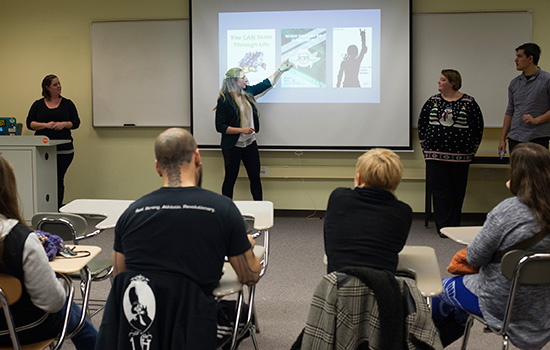Students help roller derby team stay on track
Class offers marketing help to Roc City Roller Derby to recruit members and fans
A. Sue Weisler
RIT students in the School of Communication’s Campaign Management and Planning class offer suggestions to members of the Roc City Roller Derby on ways to increase membership and fans. Amanda Carroll, a fifth-year media arts and technology student from Rappahannock, Va., points to an advertising that says “Because tough girls run in tight circles.”
Rochester Institute of Technology students in the School of Communication’s Campaign Management and Planning class went out of the box—in this case a rink—to help promote a local women’s roller derby league.
“This is it. This is the pinnacle,” Professor David Neumann told his students last week as they got ready to make their presentations to four members of the Roc City Roller Derby, their coach and a referee.
Members of the team visited the class weeks ago to tell them they wanted to be more well-known and build their fan base and membership. Students then talked with the athletes at the track and in casual settings after their practices.
Two teams of students made presentations. First up was “Creative Chaos,” whose members wanted to overcome the stereotypes of roller derby. “Roller derby in itself is confusing to understand,” said Cassie Clayton, a fourth-year advertising and public relations major from Pickering, Ont., Canada. Also adding to the edginess are the players’ personas—JoJo Thrasher, Florence Fightingale, Star Spangled BamHer and Natasha Musquashya—as they play their games in “The House of Bruise,” a former Kodak warehouse on Lincoln Street.
The students wanted to expand their social media presence, comparing it to the marketing of Buffalo’s Queen City Rollers, which has 14,000 “likes” on Facebook.
The students suggested three print advertisements in RIT’s Reporter magazine to help attract young women who may be interested in joining the team, or attracting fans to watch. They wanted to stress that Roc City Roller Derby is more than a team; its members are a family from varying backgrounds who do more than elbow opponents while circling a track on roller skates.
One student thought short profiles of team members on social media would help eliminate any intimidation newcomers may have when they first meet the team. They also recommended Guerilla Marketing techniques, handing out stickers and other “tangible stuff” with their Twitter or Instagram handles printed on them.
“The hurdle is getting people there to see a game mainly because they don’t understand it,” said Leah Giunta, a fourth-year fine arts photography major from North Reading, Mass. “Once they go, they’re going to understand.”
The second student team to present was called “A+” and also wanted Roc City Roller Derby to do more with social media. They wanted to reach strong-willed women who wanted a creative way to relieve stress.
Amanda Carroll, a fifth-year media arts and technology student from Rappahannock, Va., compared the roller derby team to other local recreational women’s sports leagues, including rugby, volleyball and kickball. She said Roc City Roller Derby appears to be less expensive, more accepting and has great camaraderie among its players.
A+ also interviewed people to see if they would be interested in watching a game, or even joining the team. Many respondents never heard of the team, but indicated they may be interested in watching a game. The students also showed some possible ads, with sayings: “You CAN skate through life” and “Because tough girls run in tight circles.”
After a brief discussion in the hallway, the Roc City Roller Derby members announced their reaction to the presentations.
“Both groups offered unique approaches, thoughtful and engaging ideas,” said team member Ashley Gurak (Toni Sparxx when she’s on skates). “We kind of want to hire both teams.”
But in the end, Gurak said team A+ offered the ability to reach their target fan base and potential members more.
“And now that you know us, there’s no intimidation factor,” Gurak said.
Barry Strauber, who taught the class with Neumann, said he intended to make it a “real world experience” for the students. “We wanted these students to see this class as a transitional bridge to their future, a capstone experience that confirms in their minds their post-graduate aspirations,” Strauber said. “I think we accomplished that.”














